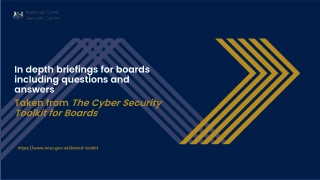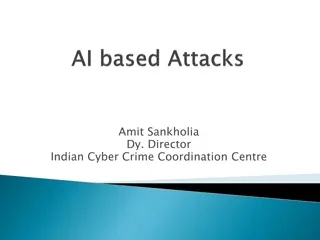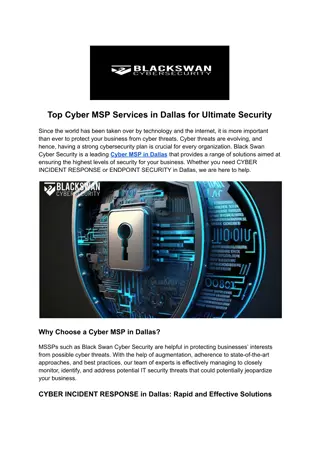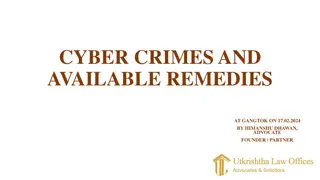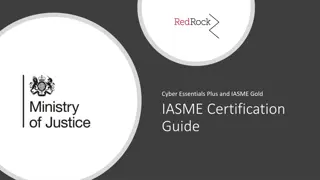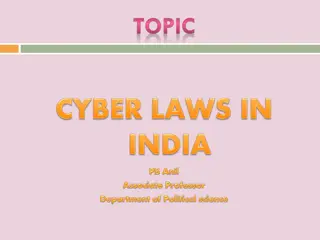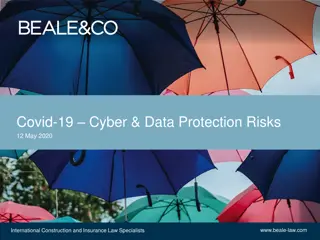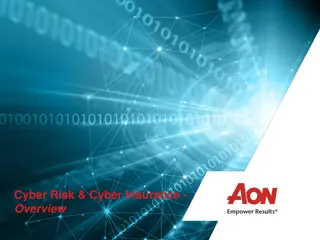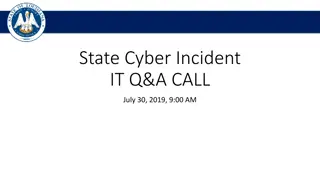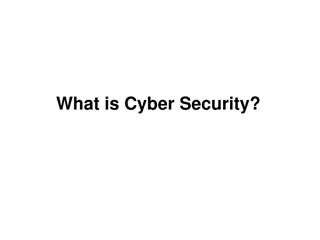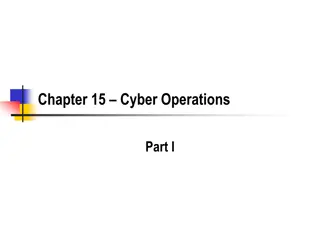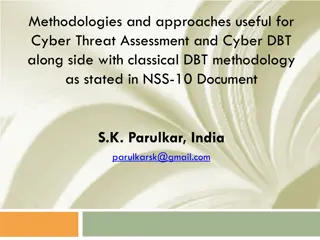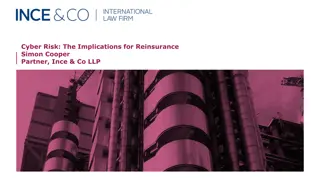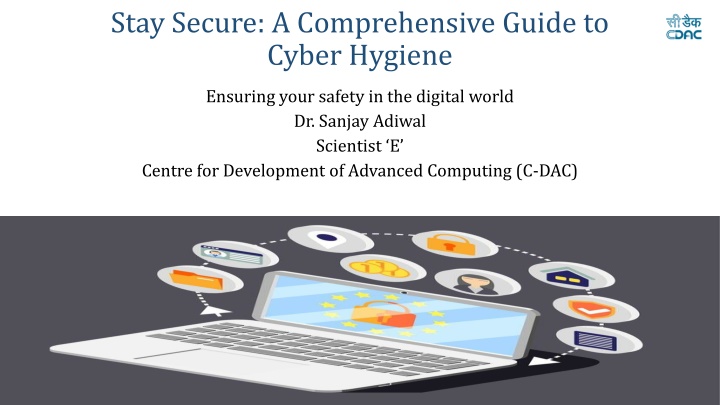
Ensuring Your Safety in the Digital World: Cyber Hygiene Guide by Dr. Sanjay Adiwal
"Stay Secure: A Comprehensive Guide to Cyber Hygiene by Dr. Sanjay Adiwal from the Centre for Development of Advanced Computing (C-DAC). Learn about Internet facts, threats, and safe Internet usage practices. Understand the importance of cyber hygiene to protect yourself online. Find out how to report cyber crimes and maintain the health of your digital environment."
Download Presentation

Please find below an Image/Link to download the presentation.
The content on the website is provided AS IS for your information and personal use only. It may not be sold, licensed, or shared on other websites without obtaining consent from the author. If you encounter any issues during the download, it is possible that the publisher has removed the file from their server.
You are allowed to download the files provided on this website for personal or commercial use, subject to the condition that they are used lawfully. All files are the property of their respective owners.
The content on the website is provided AS IS for your information and personal use only. It may not be sold, licensed, or shared on other websites without obtaining consent from the author.
E N D
Presentation Transcript
Stay Secure: A Comprehensive Guide to Cyber Hygiene Ensuring your safety in the digital world Dr. Sanjay Adiwal Scientist E Centre for Development of Advanced Computing (C-DAC)
Internet Facts Understand Internet Cyber Hygiene Internet Threats
Facts about Internet Stay Secure - A Comprehensive Guide to Cyber Hygiene
Internet Fact 1 - Out of the 7.98 billion people globally, 5 billion are internet users, according to the latest UN data.
Internet Fact 2 - Of these, 92.4% access the internet via their phones.
Internet Fact 3 - On average, an internet user spends 6 hours, 53 minutes online per day.
The Internet World Courtesy www.submarinecablemap.com
How and for what purpose do you use the Internet ? Communication Education Online Shopping E-mail Fun/Entertainment Social Networking Online Banking 19/03/2025
Ask your self whether Internet usage is safe or not ?? 19/03/2025
Hacker can Access your Phones Camera 19/03/2025
How do I report a Cyber Crime? National Cyber Crime Reporting Portal https://cybercrime.gov.in/ 19/03/2025
Cyber Hygiene A set of practices and steps taken to maintain the health of your digital environment. Cyber hygiene practices and steps that users take to maintain the health and security of their digital devices and online activities. Good cyber hygiene helps protect sensitive information and reduce the risk of cyber threats. Ultimately, it aims to create a safer digital environment for individuals and organizations alike. refers to the 19/03/2025
Common Cyber Threats Malware Malicious software designed to harm or exploit devices eg. Viruses, worms, Trojans. Ransomware A type of malware that encrypts files and demands a ransom. Social Engineering Manipulating individuals into divulging confidential information. Phishing Deceptive attempts to obtain sensitive information via fake emails or websites. 19/03/2025
Malware Stay Secure - A Comprehensive Guide to Cyber Hygiene 19/03/2025
Malware Definition Malware (short for malicious software) is software designed to harm or exploit any device, service, or network. Malware is intended to steal data, disrupt operations, or cause damage to the target system. Key Characteristics Can infect computers, mobile devices, and networks. Includes viruses, worms, ransomware, and more. 19/03/2025
How Does Malware Spread? Email Attachments: Malware spreads through infected email attachments. Malicious Websites: Clicking on dangerous ads, links, or downloading infected files from untrusted sites. Software Vulnerabilities: Malware can exploit security gaps in outdated software. Removable Media: USB drives and external devices can carry malware from one system to another. Peer-to-Peer Networks: Sharing infected files over networks or file-sharing services. 19/03/2025
Types of Malware Viruses: Attach to programs/files and spread when executed. Worms: Self-replicating malware that spreads without user intervention. Trojan Horses: Disguised as legitimate software, they create backdoors for attackers. Ransomware: Encrypts files or locks systems and demands payment for access. Spyware:Secretly monitors and collects information from a user s system. Adware: Displays unwanted ads and tracks online activities. 19/03/2025
Malware- VIRUS Definition: A computer virus is a type of malicious software (malware) that attaches itself to a legitimate program or file. It can replicate itself and spread to other files, devices, or systems. Key Characteristics: Infects files or software. Can self-replicate and spread without user knowledge. May cause damage to systems, files, or data. 19/03/2025
Protecting Your Computer from Viruses Use Antivirus Software: Install and regularly update antivirus software. Enable Firewalls: Firewalls block malicious traffic and potential threats. Be Cautious with Email Attachments: Avoid opening attachments from unknown senders. Update Software Regularly: Patches and updates fix security vulnerabilities. Backup Your Data: Regular backups protect your data in case of a virus infection. 19/03/2025
Malware - RANSOMWARE Definition: Ransomware is a type malware that blocks access to a computer system or encrypts files until a ransom is paid. The attacker demands payment (often in cryptocurrency) in exchange for restoring access to the system or decrypting files. Key Features: Can encrypt files or lock access to entire systems. Typically demands payment through cryptocurrency (e.g., Bitcoin). Can affect individuals, businesses, and government institutions. 19/03/2025 20
Ransomware Case Study AIIMS, Delhi was hit by a cyber- attack in 2022 which forced the medical institution to switch to a manual mode of operations. Targeted the including patient research data, and administrative information. LockBit ransomware allegedly approximately Rs 200 crore in cryptocurrency. IIMS server was down for six days in a row as a result of the attack. sensitive data, records, gang, demanded 19/03/2025
Virus total to check a file contains malware? 19/03/2025
Social Engineering Stay Secure - A Comprehensive Guide to Cyber Hygiene 19/03/2025
What is a Social Engineering Attack? Definition: Social Engineering is the use of psychological manipulation to deceive individuals into revealing sensitive information or performing actions that compromise security. It relies on human interaction and manipulation rather than exploiting technical vulnerabilities. Key Features: Targets human behavior rather than technical weaknesses. Often involves trust, fear, or urgency to manipulate the victim. 19/03/2025
SOCIAL ENGINEERING Through Web 19/03/2025
SOCIAL ENGINEERING Through Email 19/03/2025
SOCIAL ENGINEERING Through Email 19/03/2025
Demo Social Engineering through Email 19/03/2025
SOCIAL ENGINEERING Through SMS Smishing (SMS Phishing): Attackers send fraudulent text messages containing malicious links or prompts to call a fake customer support number, aiming to trick recipients into revealing personal information or installing malware on their devices. 19/03/2025
SMISHING EXAMPLE 19/03/2025
Social Engineering using Phone-Digital Arrest 19/03/2025
Digital Arrest 'Mann Ki Baat': PM Modi cautions people against digital arrest scam by fraudsters posing as law enforcement officials Indians lost Rs 120.3 crore in the digital arrest fraud during the first quarter of 2024. 7.4 Lakh Cyber Crime Complaints were received in Q1. victims lost a cumulative amount of Rs 1,776 crore to these scams. Stop, Think and Act. 19/03/2025
The victim, was threatened with fake cases, held under digital arrest for almost a month claiming that he was under investigation and accessed his bank accounts and transferred the money. Received a call from unknown people claiming to be from TRAI and informed him that his SIM number was being used for illegal activities and Mumbai Police had probed a case. The caller informed him further that using his Aadhaar card, a person identified as Naresh Goel had opened a bank account in a nationalized bank and used the account for money laundering to the tune of 6 crore. 19/03/2025
The accused made him download a video calling app and said that he was under digital arrest and forced him to give access to all his bank accounts for verification. Man, followed their instructions for one month and did not reveal this to anyone, as they had threatened him with dire consequences. The accused accessed all his nine bank accounts and made transactions totalling worth 11,83,55,648.52 between November 11 and December 12. 19/03/2025
What is a digital arrest scam? A digital arrest scam is an online scam that defrauds victims of their hard-earned money. The scammers intimidate the victims and falsely accuse them of illegal activities. They later demand money and puts pressure for making the payment. them under 19/03/2025
How digital arrest scam works? Perpetrators pose as law enforcement officials, such as CBI agents, income tax officers, or customs agents, and initiate contact with victims via phone calls. Subsequently, they request that the victims switch to video communication through platforms like WhatsApp and Skype. The scammers then threaten the victims with a digital arrest warrant, citing various reasons such as financial misconduct, tax evasion, or other legal violations. In certain instances, these fraudsters create a police station-like set-up to further convince victims that the call is legitimate. Under the guise of clearing their name , assisting with the investigation , or refundable security deposit/escrow account , individuals are coerced into transferring large sums of money to specified bank accounts or UPI IDs. Once the victims comply and make the payment, the scammers vanish, leaving the victims to face financial loss and potential identity theft. 19/03/2025
How to avoid becoming a victim of digital arrest scam? Stop, Think and Act. Be suspicious of calls from fake officials claiming that you are in trouble. It is always important to remember that real law enforcement agency officials will never ask for payment or banking details. Do not give in to the pressure tactics deployed by cyber criminals, who seek quick action by creating a sense of urgency . If you are suspicious about the call, verify their identity by directly contacting the relevant agency they are referring to. Try to be calm and do not panic. Avoid sharing personal information and never disclose sensitive personal or financial details over the phone or video calls, especially to unknown numbers. Remember, government agencies do not use platforms like WhatsApp or Skype for official communication. Call 1930 19/03/2025
Know the number of connections issued in your name by logging in using your mobile number https://tafcop.sancharsaathi.gov.in/telecomUser/ 19/03/2025
Common Email Threats Email spoofing Malware attachments Spam and unsolicited emails Phishing attacks
Phishing Duplicate websites Attackers create duplicate websites which look similar to original website and try to get personal information, banking information etc


